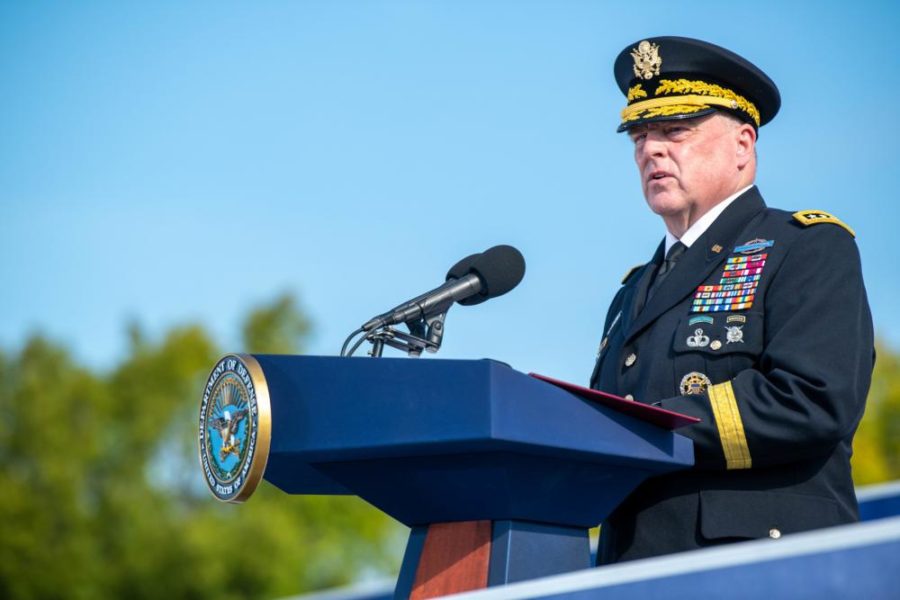Facing intense partisan criticism over his actions in the final few months of President Donald Trump’s administration, Chairman of the Joint Chiefs of Staff Gen. Mark A. Milley’s office released a statement Sept. 15 seeking to defend him.
Milley’s statement comes after details from the forthcoming book “Peril,” written by reporters Bob Woodward and Robert Costa, were reported Sept. 14. Particularly, Woodward and Costa wrote that Milley, worried about President Trump’s actions following the Nov. 3 election, twice called Gen. Li Zuocheng of the People’s Liberation Army, once in November and again in January, to reassure him that the U.S. would not strike China with nuclear weapons. During one call, Milley went so far as to assure Li that if the U.S. were to attack, Milley would give Li advance warning.
The details from the book were reported by The Washington Post and immediately set off a controversy, with several senators and representatives calling on Milley to resign, be fired, or be court-martialed for undermining civilian control of the military.
Sen. Marco Rubio (R-Fla.) was one of the most prominent voices calling for Milley’s dismissal, saying his actions create a “dangerous precedent that could be asserted at any point in the future by Gen. Milley or others. It threatens to tear apart our nation’s longstanding principle of civilian control of the military.”
Rep. John Garamendi (D-Calif.), however, defended Milley, saying in a CNN interview that Milley, as part of his job, “would call a meeting, given the concerns of an unhinged president at that period of time.”
Trump himself issued a statement saying that if the report was true, Milley had committed treason.
Milley, who was sworn in as Chairman of the Joint Chiefs of Staff in September 2019, is halfway through a four-year term in the position, though he can be fired by the President.
In a Sept. 15 statement, Joint Staff spokesperson Col. Dave Butler confirmed that the calls took place but defended them as proper and in keeping with Milley’s role.
“The Chairman of the Joint Chiefs regularly communicates with Chiefs of Defense across the world, including with China and Russia. These conversations remain vital to improving mutual understanding of U.S. national security interests, reducing tensions, providing clarity, and avoiding unintended consequences or conflict,” Butler’s statement read.
“His calls with the Chinese and others in October and January were in keeping with these duties and responsibilities conveying reassurance in order to maintain strategic stability. All calls from the Chairman to his counterparts, including those reported, are staffed, coordinated, and communicated with the Department of Defense and the interagency.”
In “Peril,” Woodward and Costa also detail an incident in which Milley gathered senior officers to review the procedures for launching nuclear weapons, “saying the President alone could give the order—but, crucially, that he, Milley, also had to be involved,” according to the Post report.
The statement from Milley’s office sought to portray the incident as another instance of Milley performing his duties as Chairman of the Joint Chiefs.
“In keeping with his responsibilities as senior military advisor to the President and Secretary of Defense, General Milley frequently conducts meetings with uniformed leaders across the Services to ensure all leaders are aware of current issues,” the statement said. “The meeting regarding nuclear weapons protocols was to remind uniformed leaders in the Pentagon of the long-established and robust procedures in light of media reporting on the subject.”
Speaking during a press briefing Sept. 15, Pentagon Press Secretary John F. Kirby refused to comment on the “validity” of the report but did say, “I see nothing in what I’ve read that would cause any concern.”
“What I can tell you is it is not uncommon at all for the department to continue to review security protocols, particularly when it comes to our strategic deterrence capabilities, that we constantly take a look at the protocols and procedures to make sure they’re still relevant,” Kirby said. “It is completely appropriate for the Chairman of the Joint Chiefs of Staff, as the senior military advisor to the Secretary and the President, to want to see those protocols reviewed on whatever frequent basis that he wants to do that.”
Kirby appeared to react with surprise when asked if Milley should be tried for treason because of his calls to China as Trump suggested, saying, “Typically, when the Chairman or the Secretary interact with their counterparts, it’s a function of the job. They have to do that.”
“Part of the value in having these communications, particularly with countries like Russia and China, with which we are experiencing tension, is to try to reduce the risks of miscalculation and conflict, to try to take down tensions, to make clear what our national security interests are,” said Kirby. “The communications channel between our Chairman and a chief of defense is a really key vehicle for transmitting and communicating those kinds of messages.”
Kirby added that Defense Secretary Lloyd J. Austin III “has full trust and confidence in Chairman Milley and the job that he is doing,” a sentiment echoed by White House Press Secretary Jen Psaki, who said Sept. 15 that President Biden “has complete confidence in Chairman Milley.”
